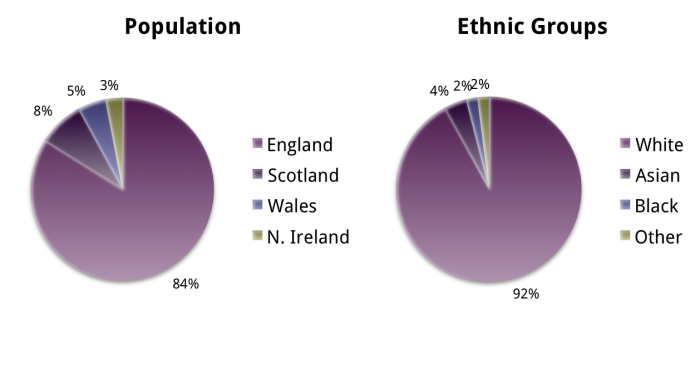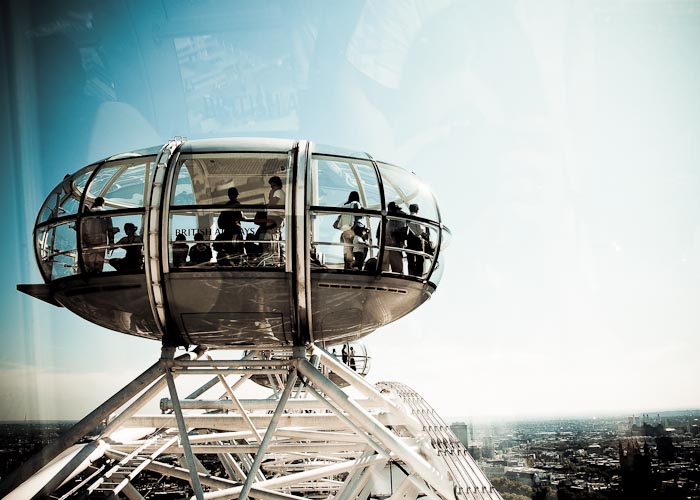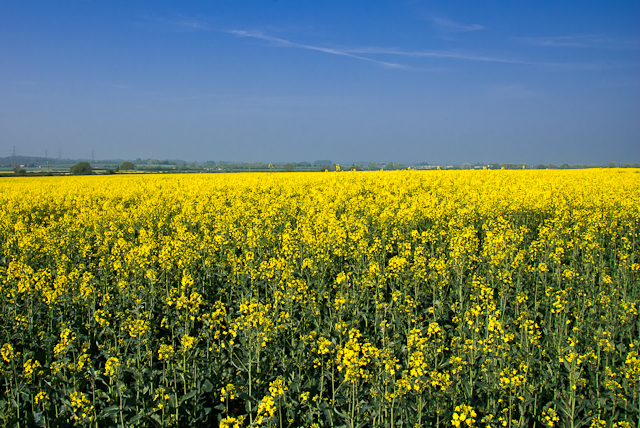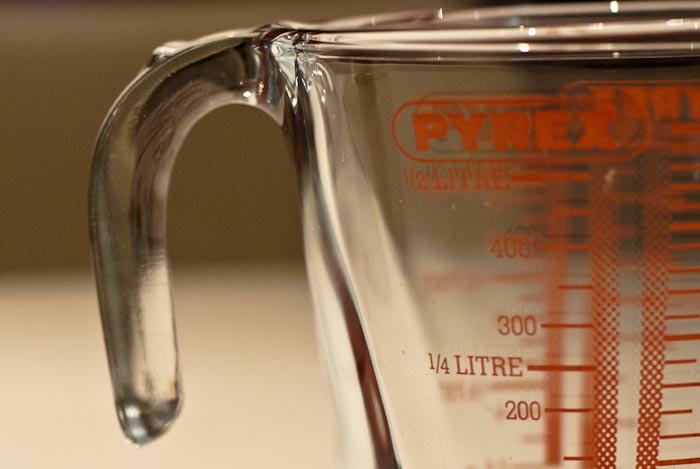Welcome to part 3 of my Life in the UK series. This week I’m learning more about what the population of the UK looks like. As in America, the UK completes a formal census every 10 years. The most recent one was in 2011 (which I’m included in and remember completing the form), however it’s data has not yet been released. So instead, statistics from the 2001 census are relied upon.
I was initially very surprised to learn that 92% of the population is considered white. However once I thought about it (and how people would answer on a census form), I shouldn’t have been surprised. As I look around when I’m out and about I do see less diversity on the surface. Certainly compared to a life growing up in Virginia where only 66% of the population was white (followed by 19% Blacks and 7% Hispanic). My statistically insignificant sample at a restaurant I had lunch in the other day had about 45 people in total (including staff) that I could see. Of these, only 3 would have been classed as non-white. (Note: I don’t normally calculate the ethnic distribution in places I eat but these lessons have inspired me to be a little more observant, and curious). But “white” is actually its own melting pot of cultures. White could be Russian, Polish, French, German. I’ve had several lovely German women in my life here, most recently my hairstylist. Just a reminder never to judge a book by its cover.
And in a nod to differences in the English language, Asian here means people of Indian, Pakistani, or Bangladeshi decent. Not Chinese or Japanese which is how I would have used this term before. Not surprisingly, most ethnic groups live in urban areas and almost half are in London and its surrounding areas.
For as many people as live here, 60 million, the UK is a small nation. The UK has similar land mass to the US state of Oregon which has only 4 million people. In terms of population density, the US has 83 people per square mile, whereas the UK has 656 per square mile. No wonder they have amazingly tiny roads, parking spaces, and semi-detached houses! And no wonder public transportation doesn’t work in America outside urban areas. Too many wide open spaces.

What’s That You Say?
As an American when you travel to the UK, you think great they speak English this will be easy. (Cause we Americans generally don’t have second languages, I’m just sayin’). The Brits say everything in a way we can understand only in a way that makes it all sound so much more posh and elegant. But holy moly. For a country this small, there are an amazing number of dialects and accents, some of which I’ve really struggled to understand. When I first moved here and was working, most of the people I worked with were from “the North.” And I tell you what, I struggled everyday to catch everything they said, especially on conference calls. It took practice and lots of TV watching to start feeling like I could regularly understand people. I’ve said more “Pardons,” “What’s Thats,” and “Say Agains” then I ever remember. And the Scots, goodness. Many of the service centers for the large banks etc. are in Scotland and I know I struggle to communicate with them over the phone. To be fair, I think they struggle with my accent just as much as I do with theirs. I’ve resorted to spelling things on several occasions.
Some of the most common dialects:
- Geordie (Newcastle) – Think Cheryl Cole
- Scouse (Liverpool) – Think Wayne Rooney, Steven Gerrard (who by the way I challenge you to listen to in a post match interview to see if you can understand I word he’s saying)
- Cockney (London) – Think Michael Caine, Russell Brand
- Scottish – Think Sean Connery
- Welsh – Think Tom Jones, Catherine Zeta-Jones
Religion and Other Traditions
The UK is still largely a Christian society, about 72% of all people. Muslims account for about 3% of the population. However, only around 10% of the population attends regular religious services. And, it’s certainly not for lack of churches. I think churches beat out even Starbucks for being on every corner.
In the UK, they celebrate largely the same festivals we’re familiar with in America, Christmas, Easter, Valentine’s Day, Mother’s Day, etc. Some of these for obvious reasons, like Christmas, are on the same day. Others like Mother’s Day always confound me as I have to remember two different dates. Celebrating Boxing Day on December 26th is a nice new tradition making the loss of Thanksgiving a little less painful.
I now totally get the reference to “Bonfire Night” (aka Guy Fawkes night) in Bridget Jones’ Diary. Also if you’ve ever seen Brits on TV in early November you’ll see many wearing poppies on their lapels. This is in honor of Remembrance Day, November 11, which commemorates those who died WWI, WWII, and various other wars. On this day there is a national 2 minute silence at 11 am.
Sporting Traditions
The UK is certainly a sporting nation. Football (soccer), tennis, rugby, cricket, golf, and Formula 1 top the list. We’re a household of avid sports fans in general but football is definitely king. And I tell you what, football has the longest playing season of any sport I’ve known. Just when I think football is over (she says with relief), it’s on again (sigh).
And I’ve realized that in the run-up to the Olympics the British calendar is loaded with major sporting events. We’ve got the Euro 2012 football tournament now underway (come on England!), Wimbledon in just a couple of weeks, then the British Grand Prix, then the Open Championship. So between now and July 27th when the Olympics start, you’ve got plenty of opportunities to appreciate the great British sporting traditions.
So pour yourself a Pimms, have some strawberries and cream, and enjoy.
This is part of my ongoing series about understanding life in the UK, an exercise that’s helping me study for my Life in the UK test. Plus, I thought it would be interesting to share some facts and observations about this country I’m living in before it takes the world stage next month when the Olympics come to town.
Other Articles in the Series:
* Source: Life in the United Kingdom: A Journey To Citizenship 2nd Edition by the Home Office



